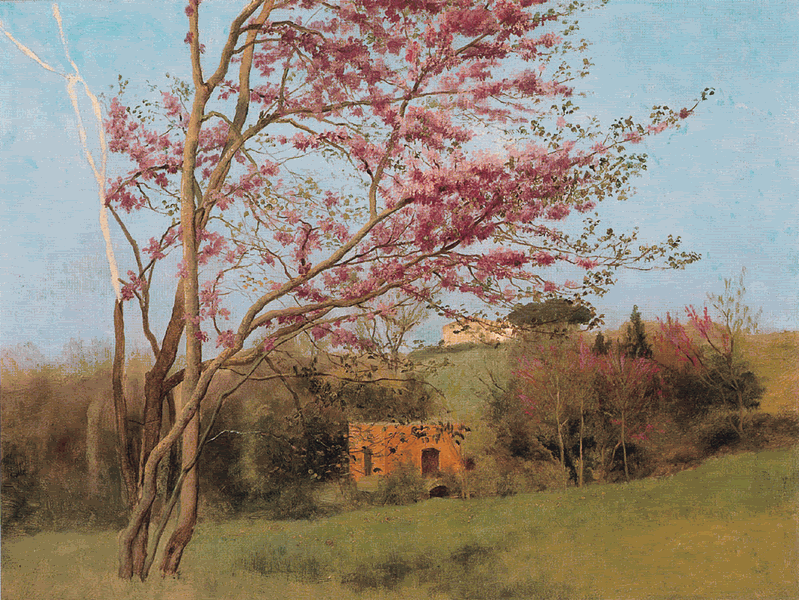Rough winds do shake the darling buds of May,
And summer's lease hath all to short a date:
Sometime too hot the eye of heaven shines,
And often is his gold complexion dimmed;
And every fair, from fair sometime declines,
And summer's lease hath all to short a date:
Sometime too hot the eye of heaven shines,
And often is his gold complexion dimmed;
And every fair, from fair sometime declines,
By chance, or nature's changing course, untrimmed ...
William Shakespeare
What Shakespeare and his contemporaries are to verse, Mozart is to music. Theirs is the poetry of transience: love that will not last, beauty erased by time, the seedling stunned by a sudden frost. Mozart lived in the late 18th century, but by temperament he was an Elizabethan. He worked within the conventions of a gilded and frivolous musical style and gave it a soul.
Even when Mozart's music is at its sunniest -- and it often is very balmy indeed, as well as galant in the best 18th century manner -- it can become sad or nostalgic in a twinkling. The sun, instantly, is veiled in clouds. It may emerge straightaway, but you cannot forget that the clouds may reappear to devour the radiance.
Mozart's music sometimes has an apparent simplicity, but it plucks every string of feeling. It can change mood almost from measure to measure -- a courtly minuet, perhaps, interrupted by a dying fall. This poignancy is stronger in Mozart than in his contemporaries, other than Haydn, who in many ways was Mozart's equal in distilling magic from sound. Beauty tinctured with sadness, a sense of the vanishing of everything, seem to impregnate many a musical phrase.
For someone of his sensitivity (musically, that is; as a man, he is said to have been charmless and vulgar), Mozart chose a poor moment to be born. In his era, composers were penny-a-liners who earned their keep by pandering to the Church or nobility. (At most courts they wore the livery of servants.) The potentates who employed them -- with some honorable exceptions, like the Esterhazys for whom Haydn worked -- wanted pretty, undemanding tunes for dances and parties.
Mozart was no musical revolutionary. He didn't break the mold like Beethoven was to do later, but he took the "givens" of his time and made them do for all time. The aristos wanted dance music? He gave them a whirl through Paradise. They wanted singing violin music, of a sort that the Italians of Vivaldi's period gave Europe a taste for? He gave the violins something worth singing.
Always, with that flavor of transience. Mozart was around during the French Revolution, but it is doubtful that it surprised him. He had sensed all along that the palaces' hundred-candle chandeliers would burn themselves to a smoky end.
In London there is a beautiful painting by Fragonard, which is nonetheless disturbing if you look closely. A richly dressed young man and woman of the 18th century are enjoying each other's company; sunlight bathes the glade in the center of the picture where they romp; pink ribbons adorn the ropes of their swing.
But the picture darkens toward the outer edges: just outside their awareness is the coming storm. Fragonard saw the guillotine at the end of the mirrored hall. Mozart simultaneously saw the shimmer and gleam of the silk, and saw it as food for the moth.
Even when Mozart's music is at its sunniest -- and it often is very balmy indeed, as well as galant in the best 18th century manner -- it can become sad or nostalgic in a twinkling. The sun, instantly, is veiled in clouds. It may emerge straightaway, but you cannot forget that the clouds may reappear to devour the radiance.
Mozart's music sometimes has an apparent simplicity, but it plucks every string of feeling. It can change mood almost from measure to measure -- a courtly minuet, perhaps, interrupted by a dying fall. This poignancy is stronger in Mozart than in his contemporaries, other than Haydn, who in many ways was Mozart's equal in distilling magic from sound. Beauty tinctured with sadness, a sense of the vanishing of everything, seem to impregnate many a musical phrase.
For someone of his sensitivity (musically, that is; as a man, he is said to have been charmless and vulgar), Mozart chose a poor moment to be born. In his era, composers were penny-a-liners who earned their keep by pandering to the Church or nobility. (At most courts they wore the livery of servants.) The potentates who employed them -- with some honorable exceptions, like the Esterhazys for whom Haydn worked -- wanted pretty, undemanding tunes for dances and parties.
Mozart was no musical revolutionary. He didn't break the mold like Beethoven was to do later, but he took the "givens" of his time and made them do for all time. The aristos wanted dance music? He gave them a whirl through Paradise. They wanted singing violin music, of a sort that the Italians of Vivaldi's period gave Europe a taste for? He gave the violins something worth singing.
Always, with that flavor of transience. Mozart was around during the French Revolution, but it is doubtful that it surprised him. He had sensed all along that the palaces' hundred-candle chandeliers would burn themselves to a smoky end.
In London there is a beautiful painting by Fragonard, which is nonetheless disturbing if you look closely. A richly dressed young man and woman of the 18th century are enjoying each other's company; sunlight bathes the glade in the center of the picture where they romp; pink ribbons adorn the ropes of their swing.
But the picture darkens toward the outer edges: just outside their awareness is the coming storm. Fragonard saw the guillotine at the end of the mirrored hall. Mozart simultaneously saw the shimmer and gleam of the silk, and saw it as food for the moth.
My favorite Mozart symphony is no. 40, in G minor. In the opening movement, a triplet phrase in the strings tumbles over itself, trying ever more insistently to force the lock of heaven. Another orchestral phrase answers, a dialogue ensues in varying inflections; the answer has the last word, but it does not seem absolute.
The second, slow movement is a "pastorale," but though it suggests summer, clouds are boiling up over the mountain. The music could be a background for a dalliance in the fields, but something tugs at the edge. Why can't this beauty last? What is being hinted at, and why?
Then comes a minuet. We are at a grand ball, the quintessential one that transcends any particular event. This is what Napoleon's minister Talleyrand was talking about when he said that only those who had lived before the Revolution knew the true sweetness of life. In the candlelight, with these musical strains in the air, all the women are beautiful, and the men genteel. It should go on forever, but will be dead with the dawn.
Now the finale, and utter glorious urgency, summed up in a phrase choired by the strings, caressed by the woodwinds. Triumph ... mixed with doubt. Is beauty truth?
Mozart is this season's poet. His music is for Spring because it contains the world, dying to be born; the earth dressing for its yearly tryst with the sun; the buds telling us that we, too, will be born again. And the rough winds.
The second, slow movement is a "pastorale," but though it suggests summer, clouds are boiling up over the mountain. The music could be a background for a dalliance in the fields, but something tugs at the edge. Why can't this beauty last? What is being hinted at, and why?
Then comes a minuet. We are at a grand ball, the quintessential one that transcends any particular event. This is what Napoleon's minister Talleyrand was talking about when he said that only those who had lived before the Revolution knew the true sweetness of life. In the candlelight, with these musical strains in the air, all the women are beautiful, and the men genteel. It should go on forever, but will be dead with the dawn.
Now the finale, and utter glorious urgency, summed up in a phrase choired by the strings, caressed by the woodwinds. Triumph ... mixed with doubt. Is beauty truth?
Mozart is this season's poet. His music is for Spring because it contains the world, dying to be born; the earth dressing for its yearly tryst with the sun; the buds telling us that we, too, will be born again. And the rough winds.





3 comments:
Very nicely expressed. Thank you, Mr. Darby.
The 40th is as close as humans have come to perfection. And he wrote it in what - 3 weeks?
Your theme of the ever present an unstable mix of beauty and sadness is surely well borne out by the 40th - particularly the re-statement of the Finale's second figure - a jaunty little tune the first time round - in the minor key. With the entire rest of the symphony having played out before it, it's almost unbearably aching - and then that final mad dash thru the coda to the end. Now I know he did that because that was the rule - if you started out in g minor you have to finish in g minor - but with Mozart, the rules were never a hindrance - it was like he invented each form each time he composed.
-j,
I apologize for not expressing my thanks earlier; I sometimes don't bring up my blog for a while after a posting.
kiera,
Your commentary on no. 40 makes me want to go listen to it again right away. You are a brilliant musical listener (and I would guess you are a musician). I am flattered that you would respond to my posting, which strained my own powers of description to the limit.
Mozart wrote it in three weeks? That would be unbelievable, except that I think Mozart is one of the best arguments for reincarnation. You have no doubt read of his astonishing precocity. Yes, his father was a musician, but that hardly explains it. I believe Mozart was an accomplished composer in a previous life.
Post a Comment